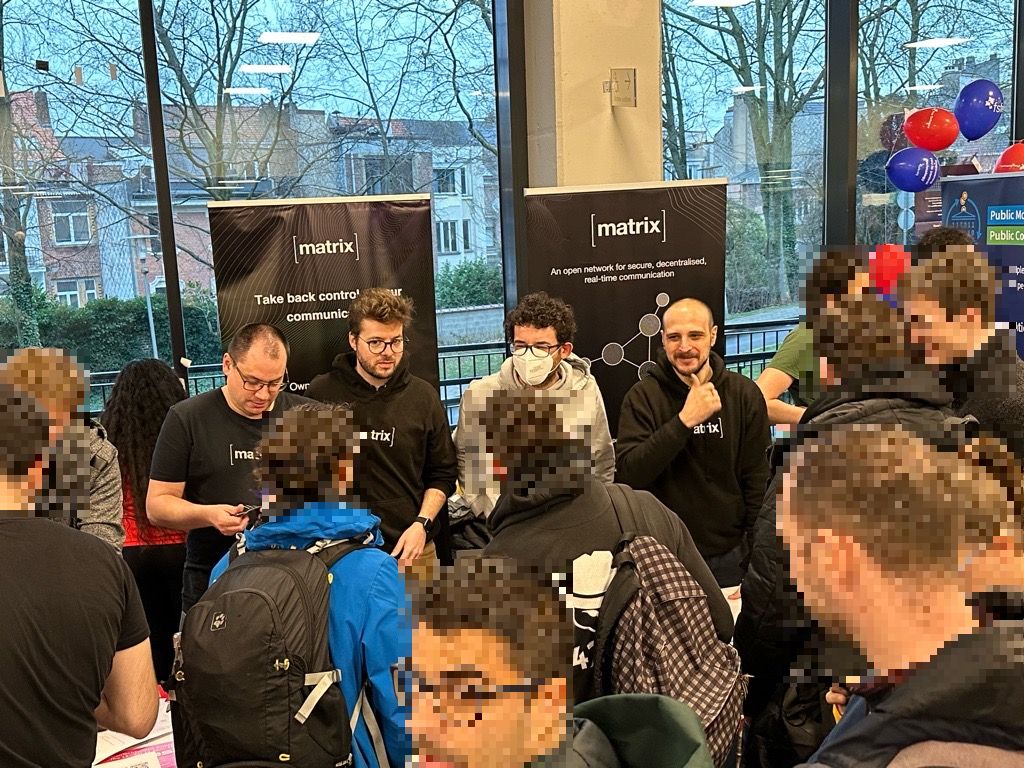For the past two years, FOSDEM couldn’t happen in-person. Fortunately we could help, and Matrix hosted the world's largest free & open source software conference online! This year we were finally back in-person… but not only.
The set-up we have arranged in 2021 and polished in 2022 has proved to be robust and served us well during the pandemic. Returning to an in-person conference didn’t mean we had to throw it all away… quite the opposite!
This year the OSS community could gather in-person, go see each other’s stands, and attend all too few of all the fascinating talks the speakers had prepared for us… but the conference was yet more.. Some of us couldn’t make it in person but could attend FOSDEM online from its Matrix Space. Devrooms were broadcasted live into the Matrix rooms where devroom managers and speakers could interact with the online audience.
In total, thousands of users joined us online, both locally and remotely as seen from the FOSDEM homeserver: an amazing audience given the possibility to be on site.
For us, it was also an opportunity to announce Matrix 2.0 to a live audience! Matrix 2.0 doesn’t mean we’re making breaking changes in the spec. It’s more of a nickname we gave to the milestone we had promised in summer to deliver by the end of the year and had far too much giving the mother of all demos to a packed room of nearly 1500 people.
🔗The first ever in-person Matrix devroom
This year was also the first ever in-person devroom for the Matrix Foundation and Community. We had many proposals and could have used the whole day, but we had to share with many other deserving communities. We’re extremely grateful to FOSDEM organisers for the devroom… and it was a huge success! At many points the room was completely packed, with no seats left at all.
We could shoehorn 8 talks in the in-person devroom. Picking them was really difficult! When one of the speakers unfortunately called in sick, the devroom healed the wound and filled the gap very quickly.
The devroom started with a quick intro to Matrix from Matthew & Amandine.
Florian followed with a talk about MatrixRTC to explore what Matrix can do beyond instant messaging
Then Matthew did an awesome demo of Third Room and “3D widgets” (user generated content) that can be embedded into its worlds. Of course with a nice “The Matrix in Matrix” scene.
Stunning 3D worlds are great, but the most popular use case for Matrix today is instant messaging. And we did a lot as the Matrix Foundation to significantly improve the performance with Sliding Sync, using matrix-rust-sdk as the showcase implementation. Kegan and Ben covered Sliding Sync and matrix-rust-sdk respectively, while Mauro showed us how Element X, the first client to use it, doesn’t stop here and goes way beyond to provide a snappy, sturdy, polished client.
Kim and Oliver from Nordeck made an interesting presentation about how widgets can make Matrix a rich app creation environment.
The Trixnity project then introduced their fast, multi-purpose, well-tested SDK. A talk you don’t want to miss, particularly if you’re into Kotlin.
Pierre from Technostructures introduced us to Kazarma a bridge between Matrix and ActivityPub. In Pierre’s own words: “we talked a lot about interoperability, and we found it sad that we talked about interoperability for proprietary platforms, not with alternative decentralised networks, so we tried doing that”. And they did. Bravo Pierre and the team!
Finally Yan concluded the in-person devroom with a speedrun of all the Matrix projects he could find around. The video is not out yet, so we’ll add it to the second follow-up blog post: the one with the online devroom conferences!
🔗Matrix for more than remote attendance
FOSDEM staff used the Matrix rooms for on-site support. Whether the camera was blurry, microphones didn’t work, or there was a missing power plug: staff could be notified and answer very quickly before sending someone to actually solve the issue. But it also allowed staff to notify devroom managers for small adjustments, if speakers ever disappeared from the scene.
Staff also told us Matrix worked much more reliably than anything other than walkie talkies from a coordination perspective and was more versatile. They consider narrowing down their use of walkies next year in favour of a deeper integration with Matrix. We’re excited to see that Matrix was yet again a great solution in the stressful, high paced context of a conference that gathered several thousand people in-person and several thousand more online.
🔗Attending in-person
Finally, a large part of the joy of attending FOSDEM comes from the people you meet there. The least we can say is that our stand was busy. We ran out of stickers and medium size t-shirts early on Sunday morning, but above all we had plenty of interesting discussions.

A few people discovered Matrix during FOSDEM and were blown away by messages making it from Slack to Discord before their eyes, all thanks to Matrix and bridges. The overwhelming majority of people who came to us were already happy users willing to discuss architecture, our plans for the future, or even to verify each other with QR Codes or emoji.
We want to thank the FOSDEM staff for organising this edition and using Matrix again: a successful return to the in-person format that builds on the online experience of the past two years. See you next year folks!
The Foundation needs you
The Matrix.org Foundation is a non-profit and only relies on donations to operate. Its core mission is to maintain the Matrix Specification, but it does much more than that.
It maintains the matrix.org homeserver and hosts several bridges for free. It fights for our collective rights to digital privacy and dignity.
Support us